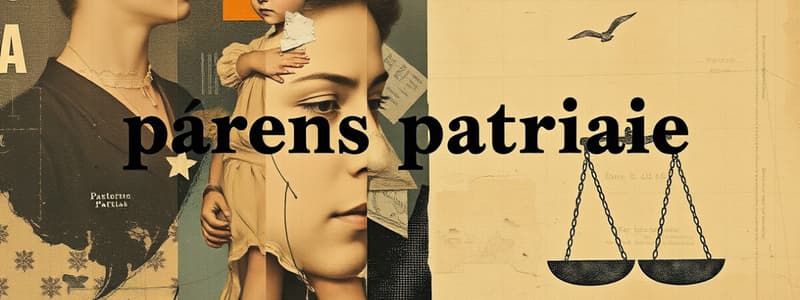Podcast
Questions and Answers
What role does the State assume under the doctrine of parens patriae?
What role does the State assume under the doctrine of parens patriae?
- A passive observer of family matters
- A caretaker with no authority
- A financial supporter of parents
- An authority figure with parental rights (correct)
In the case example provided for the doctrine of parens patriae, what was the status of the child's family situation?
In the case example provided for the doctrine of parens patriae, what was the status of the child's family situation?
- The child had siblings to support them
- The child had no family members available for care (correct)
- The child was in foster care
- The child was living with both parents
What duty does the State have toward children under the doctrine of parens patriae?
What duty does the State have toward children under the doctrine of parens patriae?
- To provide custody and recovery programs (correct)
- To oversee all family matters
- To intervene only in criminal cases
- To ensure proper education only
What constitutional principle supports the powers of government as described in the content?
What constitutional principle supports the powers of government as described in the content?
What is the essence of the statement 'He who has less in life should have more in law'?
What is the essence of the statement 'He who has less in life should have more in law'?
What was the central issue in Calalng's petition regarding animal-drawn vehicles?
What was the central issue in Calalng's petition regarding animal-drawn vehicles?
Which government authority was involved in the Calalng case?
Which government authority was involved in the Calalng case?
Which aspect is not a part of the intervention program for children under state protection?
Which aspect is not a part of the intervention program for children under state protection?
What is the primary aim of the Act regarding animal-drawn vehicles?
What is the primary aim of the Act regarding animal-drawn vehicles?
How does the law impact personal liberty and freedom of locomotion?
How does the law impact personal liberty and freedom of locomotion?
What consequence do the rules and regulations have on the riding public?
What consequence do the rules and regulations have on the riding public?
What is one reason cited for enacting the law?
What is one reason cited for enacting the law?
What does the Act prioritize over individual rights?
What does the Act prioritize over individual rights?
What legal concept is being upheld by restricting animal-drawn vehicles?
What legal concept is being upheld by restricting animal-drawn vehicles?
What is one implication of the law regarding property and business?
What is one implication of the law regarding property and business?
What is the conclusion regarding the infringement of social justice by the rules?
What is the conclusion regarding the infringement of social justice by the rules?
Flashcards are hidden until you start studying
Study Notes
Doctrine of Parens Patriae
- The State is recognized as a sovereign entity acting as parens patriae, meaning "parent of the nation."
- This doctrine allows the state to enforce public charities through its authority, especially when no other party is responsible (Chancellor Kent, 4 Kent Com., 508).
- Case Example: An 11-year-old rape survivor faces an incestuous assault from her father, with no family member capable of caring for her; the mother is overseas for work.
- State responsibilities include providing custody, intervention programs addressing the child's needs (biopsychosocial-spiritual), and filing legal cases for protection.
Basis of the Doctrine
- Established under the 1987 Philippine Constitution, which outlines:
- The powers of government are defined, limited, and distributed among various departments.
- The objective is to ensure the beneficial exercise of these powers for the public's welfare.
Social Justice Context
- Social Justice Principle: "He who has less in life should have more in law." - Ramon Magsaysay
- Maximo Calalang, a private citizen, petitioned against the National Traffic Commission's restrictions on animal-drawn vehicles.
- Restrictions limited the movement of such vehicles to avoid congestion and improve public safety on designated streets.
Legal Rulings from Calalang v. Williams
- First Issue: Do the traffic regulations infringe on legitimate business and personal liberty?
- Ruling: No, the law promotes safe transit and avoids obstructions, aiming for public convenience and safety.
- Second Issue: Do the regulations violate constitutional provisions regarding social justice?
- Ruling: No, the state has the authority to impose regulations for the general welfare, demonstrating that individual rights may be subordinated when promoting public comfort and safety.
Conclusion
- The doctrine of parens patriae signifies the state's role in protecting minors and ensuring their welfare.
- Social justice principles guide state actions to balance individual rights against the need for public order and safety.
Studying That Suits You
Use AI to generate personalized quizzes and flashcards to suit your learning preferences.




